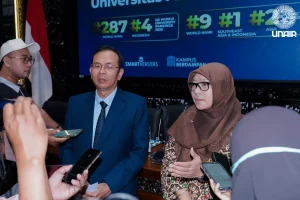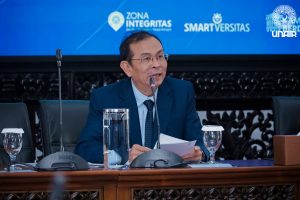UNAIR NEWS – The 13th International Convention of Asia Scholars (ICAS) continues its series of events. On Tuesday, July 30, 2024, during the fourth session, a panel discussion delved into the transformation, growth, and sustainability of South Asian societies.
The discussion, titled “Changing Drastically and Yet the Same?: Examining Growth, Transformation, Intransigence, and Continuity in Everyday Life in South Asia,” was held at ASEEC Tower, Room A9.03, Universitas Airlangga, Dharmawangsa-B Campus.
Women’s role and sexuality in India
Emiko Nozawa from Chuo University, Japan, moderated the session. Her presentation, “Partly Free: Gender Roles and Women’s Sexuality in Rural India,” highlighted that in Bihar, increased female education has enabled more women to work outside the agricultural sector. “Some women confidently express gratitude for freedoms they had never experienced before,” Nozawa remarked.
Despite this progress, traditional norms around gender roles and technology access remain strong. Men use motorcycles while women still perform household tasks with simple tools. Strong cultural practices, such as arranged marriages based on caste, continue to control women’s sexuality.
This lack of change underscores the deeply rooted cultural values that shape women’s daily lives. However, these values are not entirely resistant to change. “As attitudes toward women gradually soften, reinterpretations of these norms can bring about unexpected changes,” Nozawa concluded.
Technology eases communication for Kathmandu villagers with family abroad
Another speaker, Sanae Ito from the National Institute for the Humanities discussed how internet growth in Nepal has transformed life in a village on the outskirts of Kathmandu. She presented internet penetration in Nepal that has surged over the past decade. The percentage of internet subscriptions relative to the population rose from 2.6% in 2009 to 15.2% in 2012, reaching 97.4% in 2022.
The internet has revolutionized the flow of information to and from the village. Villagers frequently use it to communicate with family and friends living abroad. In her presentation, Ito showed photos of Kathmandu residents making video calls with their families in Australia.
“They often use video calls for intimate communication, such as before a family member moves abroad, and those living overseas can participate in festivals and events like weddings through videophone broadcasts,” Ito explained.
A decade ago, contacting family abroad was typically done through international phone calls or visiting internet cafes. Now, villagers can easily connect with their family members overseas from their homes, significantly simplifying long-distance communication.
Author: Febriana Putri Nur Aziizah
Editor : Edwin Fatahuddin









